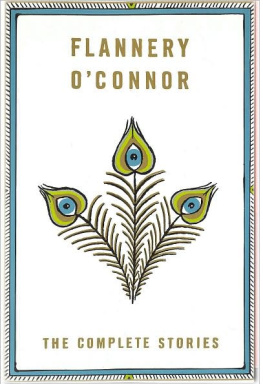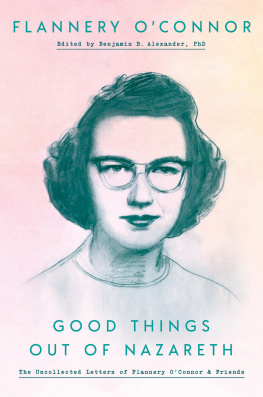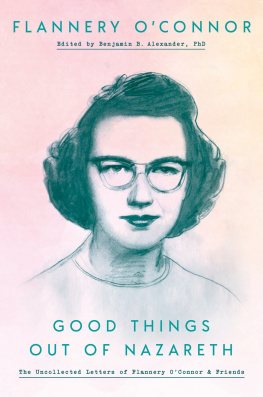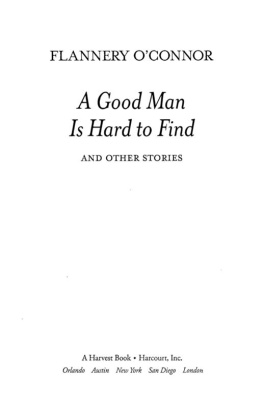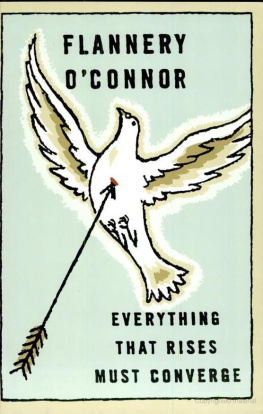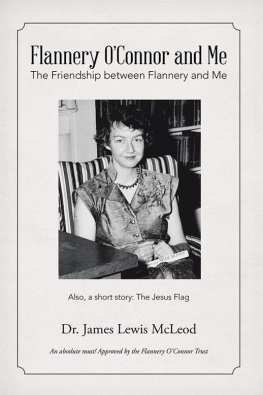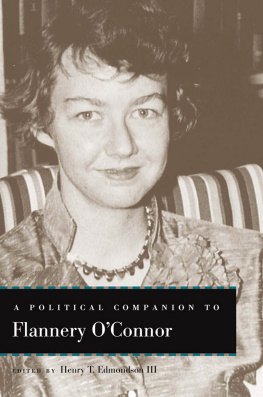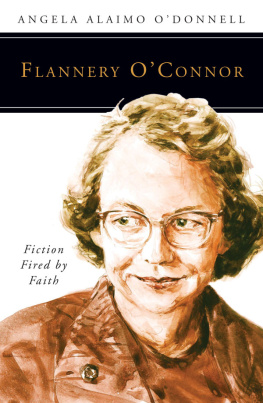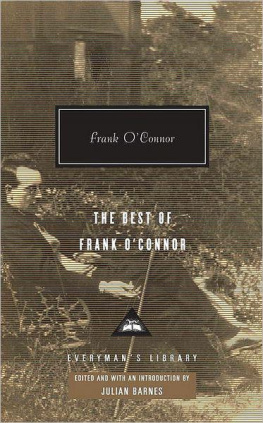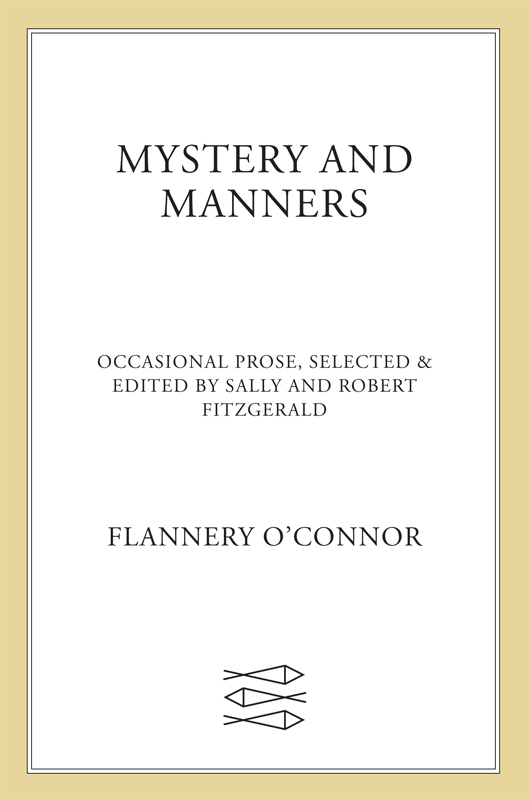
The author and publisher have provided this e-book to you for your personal use only. You may not make this e-book publicly available in any way. Copyright infringement is against the law. If you believe the copy of this e-book you are reading infringes on the authors copyright, please notify the publisher at: us.macmillanusa.com/piracy.
Contents
FOREWORD
These pieces are about equally divided between articles and essays the author published in her lifetime and material from her papers that she never revised for publication. In the second class are most of section III, the first essay in section IV, and all but the first essay in section V. The word selected on the title page of this book refers in particular to these items, but it barely suggests what the editors have done. Miss OConnor left at least half a hundred typescripts for lectures, bearing slight indication as to where they had been delivered and most often none as to when. Apparently she typed out a substantially new script for each occasion. What this usually meant was that she experimented with the same observations in a new order or with changes of phrasing and a few new sentences or paragraphs. We could distinguish four or five types of talk, depending on the audience in view: university groups, Catholics, Georgians, writing classes; but what she had to say to each overlapped what she had to say to the others, and she relied often on the same anecdotes and gags. It was difficult or impossible to discover any original or master talk in any category, although in two or three cases Miss OConnors estate or her executor had allowed a version to appear in a college magazine. In this mass of material the editors floundered for some time. We were tempted to give up, in one of two ways. We could have picked out half a dozen of these manuscripts and printed them in all their redundancy, or else we could have decided that, since these were talks drafted for reading aloud and were never worked up for publication, they should simply remain unpublished. Fidelity to the letter would have been served in the one case, fidelity of a sort to the author in the other. In neither case, it slowly became clear to us, would the reader be well served. In the end we decided to edit the body of the writing as we feel the author herself would now desire, having recourse to the same kind of shuffling as she herself so often practiced. We cut away most of the repetitions and took interesting arguments in their best available form; where rearrangements and transpositions were necessary and possible, we performed them. We resorted to footnotes for two variant passages, and two longer passages of conspicuous interest were appended to relevant essays. In general, apart from adding here and there a word of transition or making the minimum change to correct an awkward sentence, we were scrupulous to retain Flannery OConnors thought and phrasing, not to intrude our own.
Here then in reasonably full selection are the occasional writings of Flannery OConnor. The volume begins and ends with prose on which the writer bore down with craft and care. In between are examples that vary in style from a certain formality to the informality of casual speech. Plain talk abounds in sections III and IV on the study and practice of writing. The authors latest and deepest reflections are to be found in sections V and VI on the great subjects that she made peculiarly her own. It is clear that discourse, even here, had secondary importance for the author, who felt that her principal calling was to write stories and that her stories contained what she had to offer. On the other hand, she knew that those concentrations of experience and invention had their place in real contexts, literary, regional, and religious, that could and should be examined and discussed. She had a gift for this, too. Her papers not only complement her stories but are valuable and even seminal in themselves. The modest confidence with which she spoke was justified, in the view of the present editors, who in a like spirit present this book.
SF
RF
I
The King of the Birds
When I was five, I had an experience that marked me for life. Path News sent a photographer from New York to Savannah to take a picture of a chicken of mine. This chicken, a buff Cochin Bantam, had the distinction of being able to walk either forward or backward. Her fame had spread through the press, and by the time she reached the attention of Path News, I suppose there was nowhere left for her to goforward or backward. Shortly after that she died, as now seems fitting.
If I put this information in the beginning of an article on peacocks, it is because I am always being asked why I raise them, and I have no short or reasonable answer.
From that day with the Path man I began to collect chickens. What had been only a mild interest became a passion, a quest. I had to have more and more chickens. I favored those with one green eye and one orange or with overlong necks and crooked combs. I wanted one with three legs or three wings but nothing in that line turned up. I pondered over the picture in Robert Ripleys book, Believe It or Not, of a rooster that had survived for thirty days without his head; but I did not have a scientific temperament. I could sew in a fashion and I began to make clothes for chickens. A gray bantam named Colonel Eggbert wore a white piqu coat with a lace collar and two buttons in the back. Apparently Path News never heard of any of these other chickens of mine; it never sent another photographer.
My quest, whatever it was actually for, ended with peacocks. Instinct, not knowledge, led me to them. I had never seen or heard one. Although I had a pen of pheasants and a pen of quail, a flock of turkeys, seventeen geese, a tribe of mallard ducks, three Japanese silky bantams, two Polish Crested ones, and several chickens of a cross between these last and the Rhode Island Red, I felt a lack. I knew that the peacock had been the bird of Hera, the wife of Zeus, but since that time it had probably come down in the worldthe Florida Market Bulletin advertised three-year-old peafowl at sixty-five dollars a pair. I had been quietly reading these ads for some years when one day, seized, I circled an ad in the Bulletin and passed it to my mother. The ad was for a peacock and hen with four seven-week-old peabiddies. Im going to order me those, I said.
My mother read the ad. Dont those things eat flowers? she asked.
Theyll eat Startena like the rest of them, I said.
The peafowl arrived by Railway Express from Eustis, Florida, on a mild day in October. When my mother and I arrived at the station, the crate was on the platform and from one end of it protruded a long, royal-blue neck and crested head. A white line above and below each eye gave the investigating head an expression of alert composure. I wondered if this bird, accustomed to parade about in a Florida orange grove, would readily adjust himself to a Georgia dairy farm. I jumped out of the car and bounded forward. The head withdrew.
At home we uncrated the party in a pen with a top on it. The man who sold me the birds had written that I should keep them penned up for a week or ten days and then let them out at dusk at the spot where I wanted them to roost; thereafter, they would return every night to the same roosting place. He had also warned me that the cock would not have his full complement of tail feathers when he arrived; the peacock sheds his tail in late summer and does not regain it fully until after Christmas.


